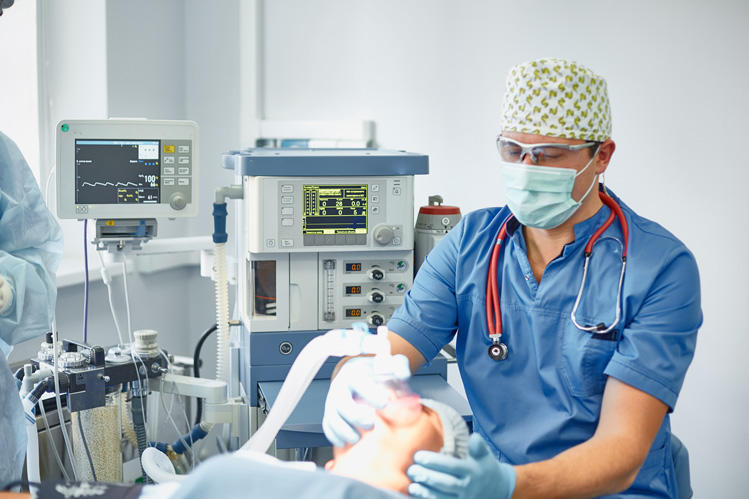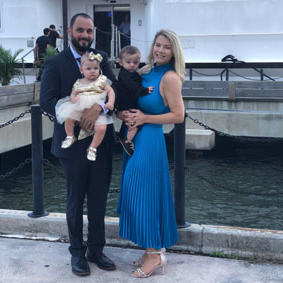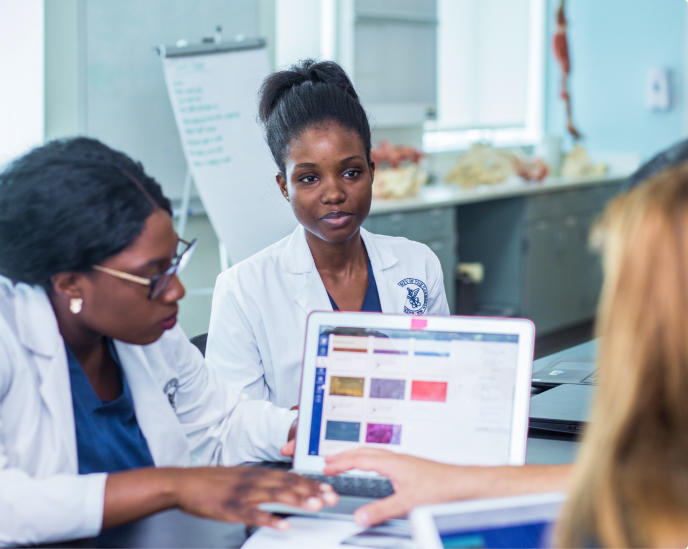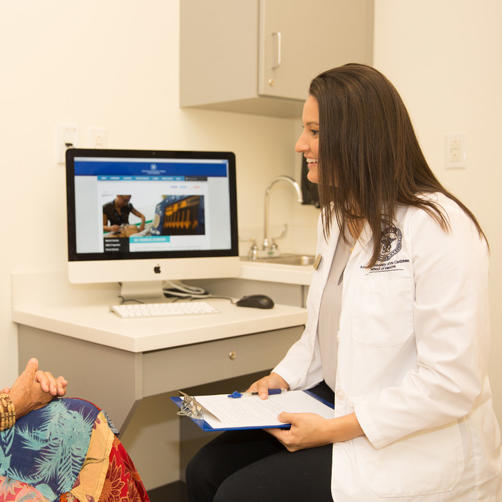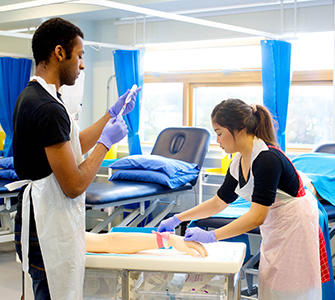If you have ever undergone surgery, you probably thought seriously about the skills and experience of the surgeon, who might literally be holding your life in his or her hands. But chances are there was at least one other medical doctor in the room—an anesthesiologist. The successful outcome of a surgery and healthy recovery depend just as heavily on the role of the anesthesiologist. But what is an anesthesiologist, and what does an anesthesiologist do?
An anesthesiologist is a medical doctor who practices anesthesia, the use of medication to produce a loss of sensation—particularly pain—in the body. Without anesthesia, most surgical operations would not be possible. Anesthesia makes the patient comfortable and reduces anxiety. It also alleviates the physical and emotional shock of surgical procedures, making it possible for the surgeon to perform complex and delicate operations.
An anesthesiologist is much more than just an anesthesia doctor, however. Before an operation, the anesthesiologist evaluates patients to ensure they are healthy enough for surgery. During an operation, the anesthesiologist monitors the patient’s vital signs and adjusts medications to ensure patient comfort. After surgery, the anesthesiologist may monitor the patient’s recovery from anesthesia and assist in the management of post-operative pain.
IS AN ANESTHESIOLOGIST A DOCTOR?
An anesthesiologist is a medical doctor with specialized training in the administration of anesthesia and in critical care. An anesthesiologist may work on a team that includes such non-doctors as certified registered nurse anesthetists and anesthesia assistants.
Types of Anesthesia
An anesthesiologist can administer several types of anesthesia, depending on the nature and severity of the operation being performed.
General anesthesia involves rendering the patient completely unconscious for the duration of surgery. Putting the patient under always carries some medical risk, so general anesthesia is often reserved for the most major surgical procedures, including open-heart surgery and major joint replacement.
Regional anesthesia involves using nerve blocks, spinal injections, and other techniques to block sensation from a major portion of the body. It is often used for surgeries of the arms, legs, or abdomen. An epidural is a common form of regional anesthesia administered to alleviate the pain of childbirth.
Local anesthesia involves the use of injections to deaden sensation in a small part of the body. It may be used in fairly minor, highly localized operations, such as oral surgery or the removal of a mole. Local anesthesia may or may not be administered and overseen by an anesthesiologist.
Sedation involves the use of medications that produce a calming effect in the patient. Minimal sedation may render the patient drowsy but still able to talk. A patient put under deep sedation will not remember the surgical procedure. Sedation is often combined with other types of anesthesia to help alleviate anxiety and ensure patient comfort.
WHAT DOES AN ANESTHESIOLOGIST DO?
An anesthesiologist does not simply put you under before a surgical procedure and then leave. Instead, the anesthesiologist provides a range of perioperative care—that is, care before, during and after an operation.
Before an operation, the anesthesiologist meets with the patient to assess general health. The anesthesiologist may review the patient’s medical history, ask questions, and look over the results of any tests. The purpose of this exam is to form an anesthetic plan tailored to the patient’s needs. On the day of the surgery, the anesthesiologist helps to prep the patient for surgery and oversees the administration of anesthetic.
The anesthesiologist generally remains with the patient throughout surgery, monitoring heart rate, breathing, blood pressure, and general level of awareness. The anesthesiologist adjusts medication as necessary to ensure the patient’s comfort and safety.
After the surgery, an anesthesiologist may monitor the patient in recovery, keeping the patient comfortable and checking breathing, circulation, blood oxygen levels, and general consciousness. The anesthesiologist may help decide when the patient has recovered from anesthesia enough to be moved to another area or discharged. Anesthesiologists may also help to develop a plan for dealing with post-operative pain.
A few anesthesiologists specialize in the treatment of nonsurgical pain. They may be involved in the management of such chronic conditions as migraine, fibromyalgia, and cancer pain.
Anesthesiologists are widely experienced in dealing with patients who are unconscious and in serious medical condition. For this reason, they may provide vital service in critical care units.
HOW TO BECOME AN ANESTHESIOLOGIST
To be an anesthesiologist, you must first become a physician by graduating from an accredited medical school—such as American University of the Caribbean School of Medicine* (AUC). The path to a medical degree at AUC, which is located on the Caribbean island of St. Maarten, is the same as at United States-based schools: two years of medical science classes and two years of hands-on clinical training. For AUC students, the medical sciences curriculum is completed at the St. Maarten campus; the clinical training can be completed at affiliated teaching hospitals in the United States or in the United Kingdom.
AUC also partners with the University of Central Lancashire (UCLan) in the United Kingdom for a “UK-track” option. The first two years at UCLan focus on studying the medical sciences. Upon completion, students receive a Post Graduate Diploma in International Medical Sciences, which AUC recognizes as equivalent to its own medical sciences curriculum. During the final two years, students can then complete clinical training across AUC’s network of affiliated teaching hospitals.
During clinical training, AUC students complete core rotations in internal medicine, surgery, pediatrics, family medicine, obstetrics/ gynecology, and psychiatry. Each individual student, then, selects from among dozens of specialty elective clerkships to fulfill their remaining clinical requirements.
During the fourth and final year of medical school, students prepare for the next phase of their medical education: residency. At AUC, the Office of Career Advisement (OCA) can help students determine which residency specialty—such as anesthesiology—suits them best. The OCA then helps students navigate the National Resident Matching Program® (NRMP®)—a placement system which medical students who wish to become licensed in the United States use to “match” with a medical residency. Residencies are required to become a licensed physician, and they last from three to eight years. An anesthesiology residency runs three to four years.
In 2021, AUC had a first-time residency attainment rate of 92 percent for 2020-2021 graduates—on par with the overall match rate (92.8 percent) for medical schools in the United States. In recent years, AUC MDs have matched with anesthesiology residencies at such hospitals as Froedtert Hospital in Wisconsin; IU Health Methodist Hospital in Indiana; and the Kendall Regional and Ocala Regional Medical Centers in Florida.
After residency, qualified candidates are certified by the American Board of Anesthesiology (ABA). A board-certified anesthesiologist may then become a Fellow of the American Society of Anesthesiologists (FASA). Doctors who want to subspecialize in a specific area of anesthesiology must take additional fellowship training approved by the Accreditation Council for Graduate Medical Education.
MEET AN ANESTHESIOLOGIST
George Soliman, MD, a 2013 graduate of AUC, is an anesthesiology and interventional pain management physician, owner/partner at Orthopedic Center of Florida. We asked Dr. Soliman to describe the role of an anesthesiologist.
Q: Why did you decide to go into your specialty?
A: My decision was based on having the perfect work life balance which has allowed me to start a family and to be present without missing important occasions due to work.
Q: Any advice to medical students considering the specialty?
A: Empathy and patience are important if you’re considering pain management.
Q: What’s the most rewarding part of your job?
A: Learning about the lives of my patients outside of their medical history.
YOUR CAREER AS AN ANESTHESIOLOGIST
As a career, anesthesiology tends to attract people who are scientifically minded. Attention to detail is important, as mistakes can have drastic consequences. An anesthesiologist must have the presence of mind to closely monitor often routine procedures and be ready to take decisive action when emergencies arise.
Interpersonal skills are important, as an anesthesiologist almost always works as a member of a care team. Most anesthesiologists work in a hospital or surgical clinic. Many anesthesiologists work long hours, requiring stamina, and night, weekend, or on-call duties are often part of the job. The payoff is an exciting, in-demand career and the reward of helping people at a critical time in their lives. Many anesthesiologists thrive on pressure and might be bored in a less intense role.
The overall job outlook for anesthesiologists is positive. Factors that specifically contribute to the need for anesthesiologists include an aging population and improvements in rates of insurance coverage. According to the American Society of Anesthesiologists, surgical procedures are on the rise, with more than 40 million conducted in the country each year.
Now that you know what an anesthesiologist does, are you interested in a high-demand career at the frontiers of medicine and surgery? Apply for admission to AUC School of Medicine to start your journey.
Related resources:


